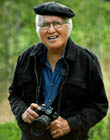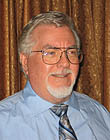|
|
 
|
|
Author
|
Topic: This is Cinerama
|
Leo Enticknap
Film God

Posts: 7474
From: Loma Linda, CA
Registered: Jul 2000
|
 posted 09-09-2002 02:42 AM
posted 09-09-2002 02:42 AM





It's a little bit ironic that, having invested huge amounts of money into the research and development with Cinerama, Fred Waller and his associates obviously had no idea whatsoever of what to film with it, hence a number of individual subjects chosen purely to show off the picture and sound resolution.The opening prologue reel with Lowell Thomas providing a potted history of motion picture history from Victorian optical toys to the coming of sound was OK as far as it goes, though his contention that Edison's The Great Train Robbery (1903) was 'the first film to tell a story' is quite simply wrong. Fictional narratives, though admittedly a lot shorter, were being made 2-3 years earlier, e.g. Fire (UK 1901) and Méliès' fantasy films from around the turn of the century. I was very taken with the way the Cinerama kicked in not with a rapidly moving camera or a huge noise on all seven channels of sound, but with a static camera (bolted to the roller coaster car) while the screen tabs opened out and just the ambient noise of the fairground. The effect was left to build up slowly, which I thought worked very well. The 145° curved screen really does have the physical effect on you Waller claimed that it would - my stomach certainly felt it when the rollercoaster started dipping. What made the actual subject far more rewarding to watch than I thought it would at first was the huge amount of detail you were able to see in the long, static shots with such a wide angle and deep depth of field. It was obvious that panning and tracking shots were virtually impossible (I noticed one very short pan in the Venice section, but no others) and I thought this would become a bit tedious after a few minutes, but the detail in the frame more than offset the lack of camera movement. For example, in the Edinburgh military tattoo you see a woman in the audience who spends the whole time looking at the camera, whilst in the opera scene a couple barge their way out of a row of seats just before the act finishes (making everyone else get up), presumably to get to the bar before the interval queue. The Vienna Boys' Choir was very dodgy - they all looked like something out of the Hitler Youth, especially the hairstyles. Given that, as the film was made in 1952, their parents could well have been involved with the Nazis, I found this scene a bit on the worrying side... The sound perked up a lot in the second half, I thought, with notably less hiss, more volume and some very nice mixing in the Mormon Tabernacle Choir numbers. The soundstage sounded very realistic, unlike in some of the first half scenes when channels just seemed to snap on and off without any fading, which I found a little disconcerting. The aerial scenes once again proved Waller right about curved screens - as the camera tilted on its mount, I found my head subconsiously tilting with it to try and regain a straight perspective. Superb presentation as always at Pictureville. There did seem to be some differential colour fading in the prints: at times in the Florida Everglades section you could see marked differences in the colour cast between panels during certain shots. But that's a very minor niggle with what was a lovely afternoon, and I certainly anticipate being back in subsequent months with as many friends and relatives as I can drag kicking and screaming across the Vale of York...
| IP: Logged
|
|
Claude S. Ayakawa
Film God

Posts: 2738
From: Waipahu, Hawaii, USA
Registered: Aug 2002
|
 posted 09-09-2002 03:52 AM
posted 09-09-2002 03:52 AM





Leo,Your comments about "THIS IS CINERAMA" bought back very happy memories of the time I saw this film over forty years ago at the long gone Princess Theatre in downtown Honolulu. The film was only a few years old by the time I saw the movie and the print was brand new with excellent color. I still remember the La Scala opera sequence from Verdi's "AIDA". I have always loved this opera and to see a small part of it in Cinerama was a delightful treat. The "America The Beautiful" segment after intermission was very touching. As an American, I was very moved as the three strip motion picture camera soared over the country from east to west, north to south and captured the beauty of America. It is unfortunate that the showing of this film in Los Angeles at the Cinerama Dome is limited. If it was on going, I would have made a special trip to see the movie. -Claude
| IP: Logged
|
|
Leo Enticknap
Film God

Posts: 7474
From: Loma Linda, CA
Registered: Jul 2000
|
 posted 09-09-2002 04:21 PM
posted 09-09-2002 04:21 PM





Claude: Any idea who the conductor was in the Aida section? The 1950s-sounding clipped strings and quite aggressive phrasing suggests Fritz Reiner or Wilhelm Fürtwangler to me, but AFAIK, neither had anything to do with La Scala. It was impossible to attempt a visual identification from the back of his head!As I'm not an American, I really can't say that I felt the emotional reaction to the aerial sequences that you did, but that didn't stop me from apprciating the technical quality of the photography, nor the precision six-part singing of the Mormon Tabernacle Choir, esepcially when they sing Their Truth Goes Marching On while the camera heads over the Rockies. I used to sing in a church choir, and know that to do that you need to be very good at sight reading, have a very good ear and be very good at hearing and understanding what the other 149 people are doing... A great film, anyhow...
| IP: Logged
|
|
|
|
John Pytlak
Film God

Posts: 9987
From: Rochester, NY 14650-1922
Registered: Jan 2000
|
 posted 09-09-2002 08:19 PM
posted 09-09-2002 08:19 PM





From Scott Norwood's website:
http://www.redballoon.net/~snorwood/book/book2.html CAPTION: The large company (there were more than 900 in all including the stagehands and technicians and the orchestra), the audience and the Cinerama camera crew worked together to put the color, the pageantry and the magnificant music of Aida on Cinerama's magic film.
CAPTION: A trio of big arcs, among many which were flown in from England to provide sufficient illumination for the color photography of the La Scala Opera Company.
MILAN -- your front row seat at La Scala
Including the orchestra, there were more than six hundred people on the stage at one time when the Cinerama camera photographed the La Scala Opera Company's brilliant presentation of the Finale of the Second Act of Aida. It turned out that there weren't enough lights in Italy to illuminate the stage; additional lights had to be flown in from England on short notice and generators to supply the current were recruited from all over Italy. A capacity audience was there by invitation to here an especially arranged performance while they "sat" for the Cinerama camera.
La Scala is the temple of operatic art, not only for Milan, but for the whole world. Almost all of the great names of the past centry and a half have sung there. It has been home to such giants as Verdi, Puccini and Mascagni, Caruso, Chaliapin and Gigli. Only someone who has lived in Milan can understand the great pride and deep feeling of possession which the Milanese feel for their La Scala. --------------------------------------------------------------------------------
CAPTION: A capacity audience filled the famous old La Scala Theater to listen to an especially arranged performance while they were photographed by the Cinerama camera.
CAPTION: The Cinerama camera works close in to give American audiences a better-than-front-row seat for the lavish La Scala Opera Company's presentation of Aida. It wasn't easy to arrange to photograph an actual performance of La Scala. The directors of the opera found it hard to believe that any motion picture could do justice to their work. The movies, they feel, have always left much to be desired so far as their ability to reproduce operatic music is concerned. The La Scala directors finally gave their permission, but only with the understanding that they would be among the first to see the results which, if not up to La Scala's high standards, would never be shown publicly. Signor Luigi Oldani, La Scala's Impressario, recently flew to New York to see his work reproduced by Cinerama. Admittedly skeptical and in no mood to approve a mediocre presentation, he stood up after the preview, not only ready to give his approval, but to make it ecstatic approval. ------------------
John P. Pytlak, Senior Technical Specialist
Worldwide Technical Services, Entertainment Imaging
Research Labs, Building 69, Room 7525A
Rochester, New York, 14650-1922 USA
Tel: +1 585 477 5325 Cell: +1 585 781 4036 Fax: +1 585 722 7243
e-mail: john.pytlak@kodak.com
Web site: http://www.kodak.com/go/motion
| IP: Logged
|
|
|
|
|
|
|
|
Michael Brown
Phenomenal Film Handler

Posts: 1522
From: Bradford, England
Registered: May 2001
|
 posted 09-25-2002 02:50 AM
posted 09-25-2002 02:50 AM




quote:
Robert E. Allen wrote:
No kidding, this thing is still around? I saw it back in the 50s at the Pantages (I think) in Hollywood when it was shown in the three projector process. I KNEW I was sitting in a chair bolted to the floor of a theatre but during the roller-coaster sequence I was white knuckled as I squeezed the chair arms to keep from falling out. I believe it is now a single film process, right? Do you happen to have a pic of the lens they use for that?
3 Strip Cinerama is still shown at the National Museum of Photography Film and Television in Bradford,UK. 3 projectors, 3 lenses and 3 projection booths. This cinema is named Pictureville as Leo mentioned. long url Long URL 2 (scroll to the bottom)
| IP: Logged
|
|
|
|
|
|
All times are Central (GMT -6:00)
|
|
Powered by Infopop Corporation
UBB.classicTM
6.3.1.2
The Film-Tech Forums are designed for various members related to the cinema industry to express their opinions, viewpoints and testimonials on various products, services and events based upon speculation, personal knowledge and factual information through use, therefore all views represented here allow no liability upon the publishers of this web site and the owners of said views assume no liability for any ill will resulting from these postings. The posts made here are for educational as well as entertainment purposes and as such anyone viewing this portion of the website must accept these views as statements of the author of that opinion
and agrees to release the authors from any and all liability.
|

 Home
Home
 Products
Products
 Store
Store
 Forum
Forum
 Warehouse
Warehouse
 Contact Us
Contact Us




 Printer-friendly view of this topic
Printer-friendly view of this topic













